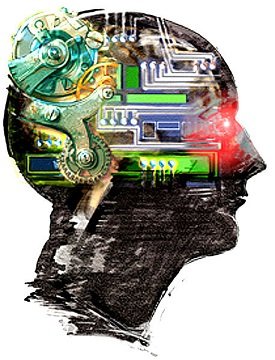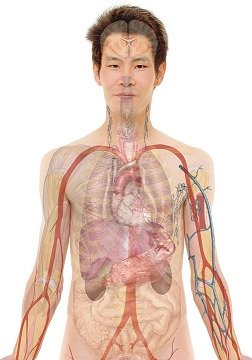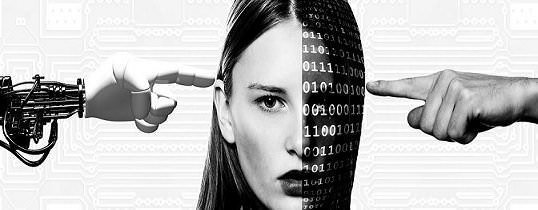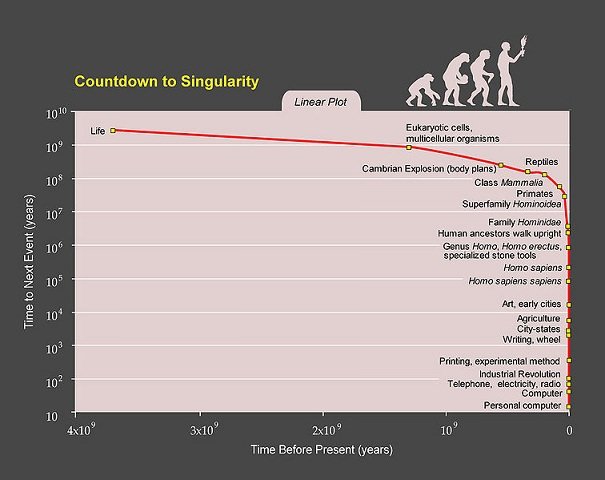Introduction
Humankind has been looked upon as an intelligent creature, and also the specie that has shown dominance and supremacy, and has almost conquered Mother Nature. No wonder our immediate past ancestors were given the fancy name; "Homo sapiens" - I mean, the "sapiens" suggested the ability to think rationally. So by inference, "Homo sapiens" transcribes to "thinking man". But when man evolved even better; another "sapiens" was affixed to the name to form "Homo sapiens sapiens", and also to distinguish between other subspecies of the Homo sapiens, like the Homo sapiens idaltu, and the Homo sapiens neanderthalensis. But is humankind still at the apex in the evolution of intelligence or will another form of intelligence arise? This is what we would look at in this post.

[Image Source: Wikimedia Commons. Public Domain Licensed]
We live in an era where the word "impossible" has almost gone into oblivion, and many things that were thought to be impossible have been achieved with mind-blowing ingenuity. For example; before the advent of airplane, it was thought to be impossible by many for a heavier-than-air flying machine to be invented, but we all know the end of the story - we now have the supersonic jets like the Lockheed SR-71 blackbirds, the hybrid Skylon, and all whatnot - at least, we are no longer stuck with hot-air balloons. This achievement is not only in the field of aerodynamics but even in the field of Artificial Intelligence; and that is why we have seen intelligent humanoid robots that have arisen with human-like cognition.
But coming to the humans (which have been seen as "biological machines" lately), we are the product of age-long evolution and adaptation. And more often than not, the patterns of these evolutionary trails can be replicated overtime in an almost definitive subsequential manner - That is why we could see some fluctuations or sinusoidal movements in evolution; where a subsequent specie could partly de-evolve (as against "evolve") from the direct ancestor. But that's what makes evolution unique, and it is also worthy to note that we are witnessing another repetition in the pattern of evolution. But before we go further; let's take a quick time travel back to where it all started.
From the start
Humans didn't just surface from oblivion or fell from the sky; neither were we seeded from an Extraterrestrial body by some sorry-arse aliens. Okay I know you're thinking that we evolved from some Ape-like ancestors. Well, that is very true, but these Ape-like creatures also evolved from something, right? So we would drive it way further down the line. Every "life" in this world are somewhat related by common ancestry, and they all started from somewhere - the Simple and Single-celled organism called Prokaryotes [ref]. These were so simple in structure that they were more or less a bunch of cytoplasm with DNA.
But just like you inferred right, evolution is a dynamic progression and changes in series of adaptative features within an organism or a specie. With the passage of time, the simple and single-celled organism started picking up some biological technology in form of Golgi apparatus, mitochondria, nuclear membrane, and all whatnot. And by selection and adaptation, these organisms moved a step forward to the Eukaryotes (though single-celled, but they were more complex than the prokaryotes). That was how all these started, and as time went on, dozens of these cells joined together to form what we call the multicellular life form, and these evolutionary processes progressed until it came to the extant modern humans. And the truth in this is - we; the humans; are a collection of somewhat of trillions of cells [ref], and these cells make up every of our organs, tissues, bones, etc.

[Image Source: pixabay. CC0 Licensed]
But all these we have seen were strongly hinged on the natural evolutionary parameters, of which "natural selection" was a major driving force, and majority of these were devoid of alteration by forces like "technology". But this era has been greeted with technological advancement, and no doubt, the creation of these technologies have affected us in many ways; including our evolutionary process. We have seen technologies like the Brain-Computer Interface, Synthetic Biology, Artificial Intelligence, Alpha-genetics, Genetic Engineering, and even the Hybridoma Technology, and some of these have just one purpose - to enhance the human body; but all these enhancement, at what cost do they come? No wonder Intelligent Selection (and even the Technological Selection) is almost overriding the Natural Selection.
Intelligent Selection kicks out Natural Selection
Charles Darwin; like we may have all known; has been credited with the postulation of the theory of natural selection, and the theory hinges on the "survival of the best fitted", of which the species that show better adaptative features would be favoured by the process of evolution. No doubt, Darwinism was seen to be majorly correct until things changed with the introduction of technology. And in this era, humans that were seen as the apex of intelligence are now incorporating technology to evolve with meta-intelligence at the rate that has never been witnessed before.
But what da heck is Meta-intelligence? For the uninitiated, I would explain it in simplified terms: Take a look at this - I told you earlier that humans are made up of a collection of trillions of cells, and these cells work in unison to create "you"... That's exactly the idea behind meta-intelligence - to merge the entire population of humans as one single intelligent platform/entity working in harmony and sympathy to each other. Even from the term "meta" you can deduce the meaning of this - that is; something "higher than ordinary". The idea was what gave rise to Singularity (Technological Singularity).

[Image Source: Pixabay. CC0 Licensed]
The concept of singularity is one that theorize the possibility of putting the total brain power of the entire human population in apposition to the absolute computational capacity of the devices and computers in the world (you can call this human-computer merger). And the truth is; that's the way to achieve meta-intelligence - I mean, you can't just combine human intelligence without mechanical assistance. For this same reason, it has been inferred that the rate of evolution of humankind has been sped up in the last couple of years by a larger margin than it has ever been seen before (thanks to emerging technology), and this is in affirmation to the words of two of many proponents of singularity:
Technology has sped up the rate of evolution - Ray Kurzweil. Source.
And this
The rate of evolution is 100million times in this era than it was... - Peter Diamandis (Co-founder of Singularity University).
What is approaching? - A change
We've had a brief overview of the past and where is all started, while relating it to this present time. But we would go a bit further to extrapolate it to the future; what does the future hold for the evolution of humankind? Well, the answer is not far-fetched, judging from the way technology has mutilated evolution, we are set to experience even further changes - but not just in our bodies (which would have been merged with machines), but in the field of information and data processing - That is; we’re approaching a point in which the data and information of every human would be collated and processed as a complex whole. That would mark the dawn of singularity.

[Countdown to singularity. Source: Wikimedia Commons. Author: Ray Kurweil. CC BY 1.0 Licensed]
Some could have reservations about this, but it is worthy to note that this merger has already begun. Taking a look at the case of Neil Harbisson that had an antenna implanted directly into his brain so he can sense colours [ref], or the case of Viktoria Modesta that willingly replaced her organic limb with a bionic limb [ref], or maybe looking at the technology of Human-Computer Interface; HCI (and the Brain-Computer Interface; BCI), to say that humans in this extant form are developing stronger bonds with technology is to say the least; so how do you think a merger is not imminent?
These technologies are moving to blur off the line dividing biology and technology, while they are at it favouring technology over biology. But the question with all these sophistication of technology is; would we still maintain our supremacy as the superior being? Well, only “time” would provide a definitive answer to this question.
Conclusion
We are in the brink of a major revolution in the evolution of humans, and this is not "evolution as usual", but "evolution unusual" - the one in which the pace is dictated by technology. The truth is, the natural process of evolution has almost been overridden by technological selection; maybe all these are drawing us closer to a point where the organic humans, the augmented humans (Cybernetic Organisms; Cyborgs), and machines would attain equality; both in state and in rights - but maybe not numerically, because they (the augmented humans) might even out-number the organic humans. Let's all keep an open mind and brace up for what lies ahead.
Thanks for reading
References for further reading:
- Origin of the first life
- Effect of technology on evolution
- Glimpse into meta-intelligence
- Human transformation with technology
All images are CC Licensed and are linked to their sources


gif by @foundation
I‘m really excited what future will bring...and somehow also a little bit scared tbh
Lol. You're scared of what the future would bring? Maybe we should be more scared of what the future would take away 😃
With all that is happening with technology, it is safe to say that humans have taken themselves out of the natural selection process
You're right. Maybe the term "natural selection" is about to be completely sidelined
You seem to have a serenity to this development that I sometimes lose myself.
I chew on this topic from time to time and have two articles about artificial intelligence in my blog history. I am torn between serenity and anxiety and associate certain sceptical to apocalyptic thoughts with it.
Nevertheless, I am sure that the technological development towards your last described effects will probably no longer be experienced by myself in all its effects. I'm thinking more of future generations and my son.
I also dislike the enthusiasm with which the topic is hyped, especially on tech-focused platforms (Steemit is one of them). As a systemicist I always see both effects: the possible gain as well as the possible loss of human relationships.
It has become clear to me that efforts to "improve" people by either merging with machine technology or using it for decision-making processes are merely an attempt to reduce complexity. The reduction of complexity has always been part of humanity, such as religion, tradition and hierarchy. Or language itself. It seems that we are increasingly aiming to overcome the current complexity with a small lead. However, from my point of view I think that alternatives to this would be considered too few or too pessimistically. To work on dismantling or de-growth.
A really difficult subject.
All in all, I am more of a sceptic about the technological solutions promised, which have always been spread between humans like a kind of saviour for problems. The level of uncertainty is something that people find difficult to live with, yet it is exactly what is important. To be aware that trust begins where absolute answers cannot be found.
I will try to keep trusting.
Thanks for coming around.
Exactly; well, except a form of immortality is achieved before then, and you can extend your life indefinitely to witness all these technological advancements first-hand.
I'm a proponent of emerging technologies by the way; and from my opinion, technology is still in its infancy and we would experience further advancements geometrically.
Imagine how some few years from now would be in the tech world... we can only imagine that.
Ah, ... well. Then my question to you would be:
Why do you want to be immortal?
Maybe not really immortal, but to be able to reverse the effects of senescence. Who wouldn't want that ability?
Maybe it would give us more time to figure out how to solve the world's problem.. People would now know they would stick around for a while, so they wouldn't want to mess up Mother Earth
What would be the ideal lifespan?
Lol.. Well, the point is; it should be placed into our hands the ability to determine how long we would live. But that's my opinion though :D
To the question in your title, my Magic 8-Ball says:
Hi! I'm a bot, and this answer was posted automatically. Check this post out for more information.
The last time I saw your comment, you were at rep 8. But now you're at rep 3... With the way your rep is descending, it could discover crude oil soon :p
Lol
actually, I find him funny. Poor magicball :(
Lol. Same here... Poor funny bot :D
This post has been voted on by the steemstem curation team and voting trail.
There is more to SteemSTEM than just writing posts, check here for some more tips on being a community member. You can also join our discord here to get to know the rest of the community!
Congratulations @samminator! You have completed the following achievement on Steemit and have been rewarded with new badge(s) :
Click on the badge to view your Board of Honor.
If you no longer want to receive notifications, reply to this comment with the word
STOP